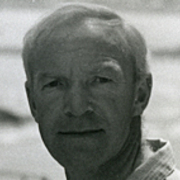
Frank Chilton
Frank Chilton joined the National Film Unit in April 1951, at the age of 35. Recently arrived from England, he had worked in the film industry there making documentaries at the Times Film Unit and Shell Film Unit. Chilton had even been nominated for a Palme d'Or at Cannes, for short film Ocean Weather Ship. Bringing with him a range of skills, he was clearly competent as a cameraman, writer, editor and director.
His first job at the NFU was editing the documentary Tuberculosis and the Maori People (1952). Made for the Health Department, it was the first of many health and welfare films that would characterise much of the rest of his career.
Filming for the NFU inevitably meant making 16mm colour scenic films for the Tourist and Publicity Department, and his next two films publicised the attractions of Nelson and Tauranga.
From late 1952 he filmed or directed over 50 items for the monthly magazine-film series Pictorial Parade. Among early items he directed were the half-reel item 14 Squadron Takes Off for Cyprus for Pictorial Parade No. 1, and the single-item reel Pictorial Parade No. 8 - New Zealand Celebrates Coronation.
During the 1953-54 royal tour he travelled with the royal entourage filming in black and white for the NFU's seven Pictorial Parade 'royal tour specials'. At various points along the journey, other cameramen were on hand to ensure full coverage of events.
Of particular note among his later Pictorial Parade items are those illustrating his concern for the health and safety of children. Friends of the Children, foreshadowing a longer film to come, dealt briefly with the Cerebral Palsy Unit at Queen Elizabeth Hospital in Rotorua; Prudence at Home, drew attention to household dangers; and Attack on Asthma showed how asthmatics were being helped to overcome breathing difficulties in a natural way.
It was for full-length documentaries that he developed a particular flair. His moving, feature-length documentary The Treatment of Cerebral Palsy in New Zealand (1955) was highly-praised and received the Diploma of Merit from the Edinburgh Festival in 1957. Although intended for specialised audiences, it was more comprehensible to general audiences than the two didactic follow-up films on early diagnosis and treatment of the condition.
From 1955, when he was appointed South Island representative of the National Film Unit, he was stationed in Christchurch. The presence of a permanent cameraman in the area was expected to provide for better coverage of important local events. Among films that benefitted from his proximity were Skylarks over Simon's Hill (1960) and The Glacier Climbers (1964), the latter featuring Sir Edmund Hillary.
To celebrate the golden jubilee of the Plunket Society, Chilton wrote and directed Born in New Zealand (1958), a documentary dealing with its origins and on-going health and welfare services.
Residing in the South Island did not prevent him from spending a good deal of time making films in the Pacific. Western Samoa, as it prepared for independence, was the subject of a number of his films. He also directed The Cook Islands Look Ahead, filmed during and after the Cook Islands independence celebrations, for screening on New Zealand television in 1965.
The award of a short-term travel grant by the Arts Council enabled him to visit Britain, Europe, North America, Australia and the Far East to study methods of production and distribution of films and how these might be applied in New Zealand. During his three months abroad in the latter part of 1965 he was able to meet documentary pioneer John Grierson, and filmmakers attending the Commonwealth Arts Festival.
The films he directed for the NFU after his return were made for organisations supporting particular health or welfare needs. Asthma and Your Child (1967), demonstrating breathing exercises developed by Bernice Thompson, was commissioned by the Canterbury Medical Research Foundation. A Deaf Child in the Family (1969), was made for the New Zealand Teaching Films to Help Deaf Children Society, a group specially formed to fund the film.
Longer-established groups also recognised Chilton’s reputation and sought his services to make the films they required – Recovering from a Coronary (1970) for the National Heart Foundation of New Zealand, A Baby on the Way (1971) for the Plunket Society, and To Help a Crippled Child (1972) for the New Zealand Crippled Children Society.
In the 1973 Queen’s Birthday honours he was awarded an OBE for services to the handicapped, especially as a senior director of the National Film Unit.
Frank Chilton died in Christchurch in December 1982. He was 66.
Writing and Original Research by Clive Sowry
Sources include
Chilton, Frank, O.B.E. (Death Notice) – The Press, 17 December 1982, page 29
‘Film Unit Cameras Look at World of a Crippled Child’ – The Evening Post, 25 January 1972, page 4
“A Baby on the Way” – The Press, 25 February 1971, page 6
Max Whatman, ‘As I Was Saying’ – Christchurch Star, 26 January 1970, page 4
‘Film About Asthma Screened’ – The Press, 9 February 1967, page 14
‘Film Unit Representative Back From Overseas’ – The Press, 27 December 1965, page 10
‘Film Unit Still Winning High Honours’ – New Zealand Herald, 27 April 1957, page 20
‘Moving Film On Cerebral Palsy In New Zealand’ – The Evening Post, 21 December 1955, page 12
‘National Film Unit. Cameraman to Work in Christchurch’ – The Press, 27 April 1955, page 11
‘Permanent Records of the Royal Tour’ – New Zealand Listener, 2 January 1954, page 6